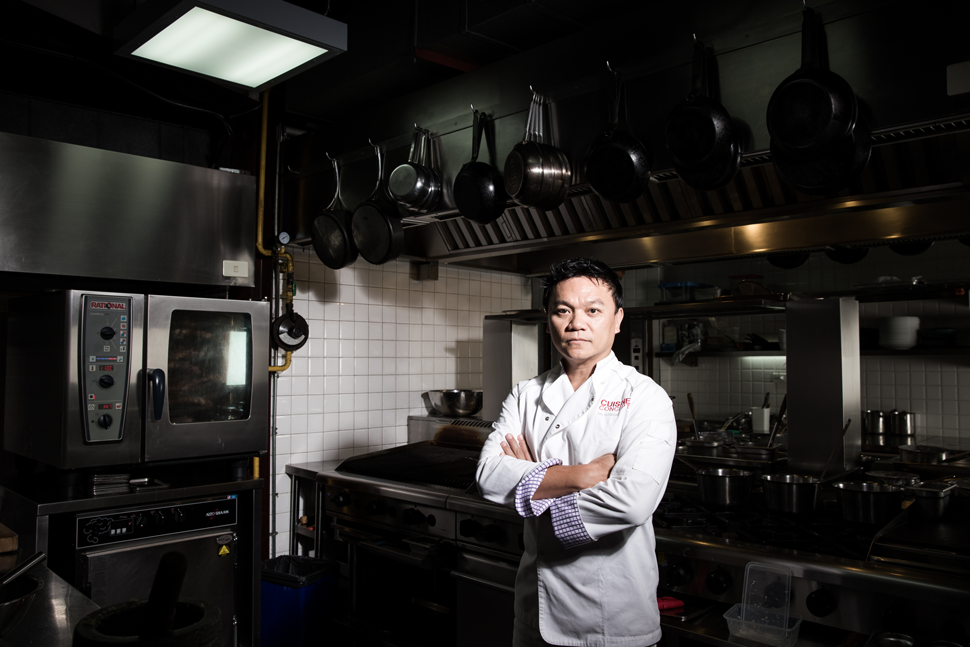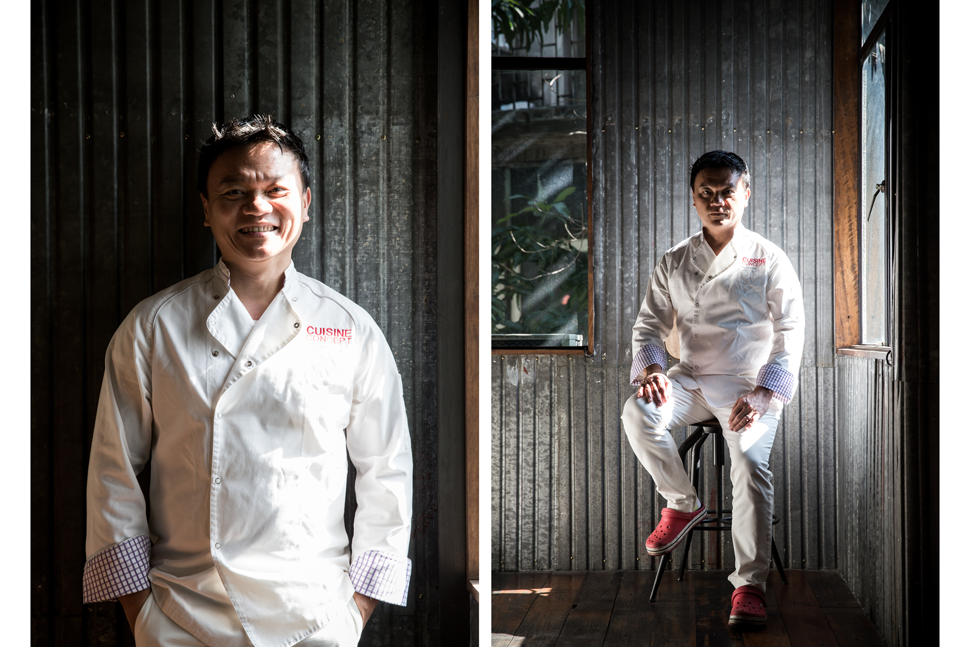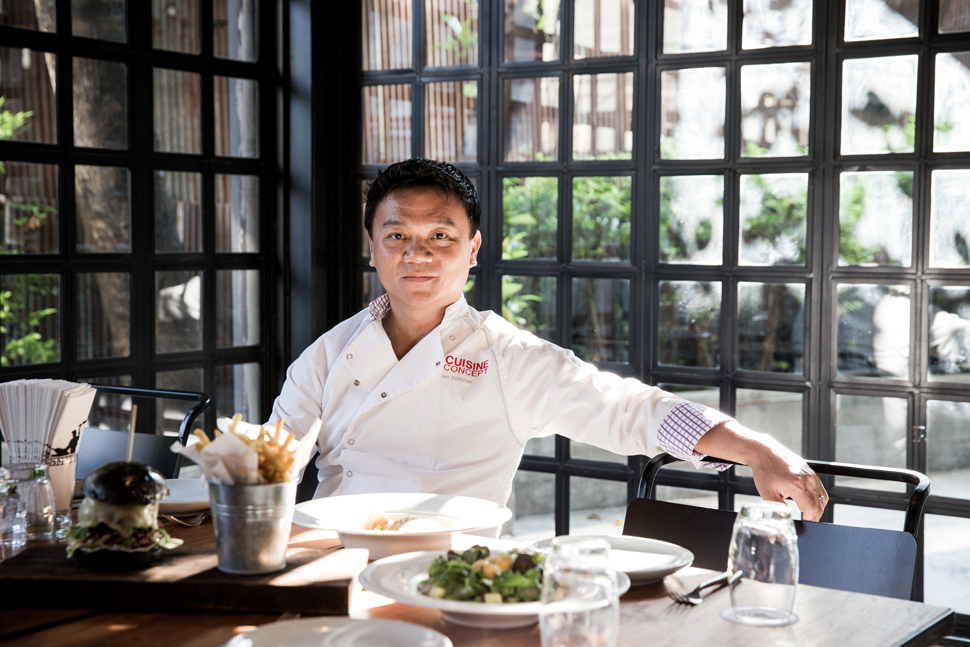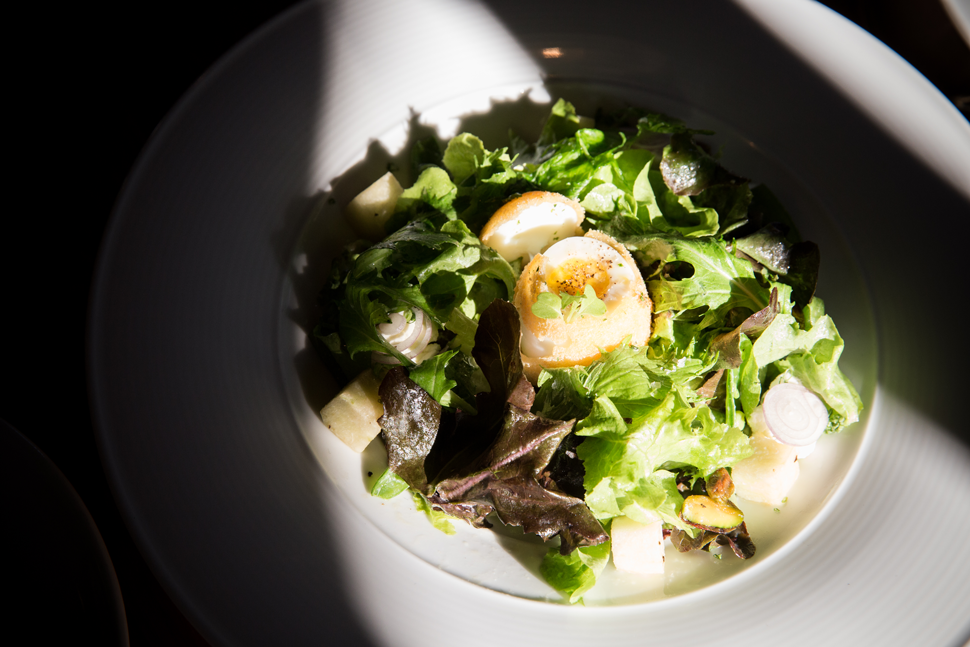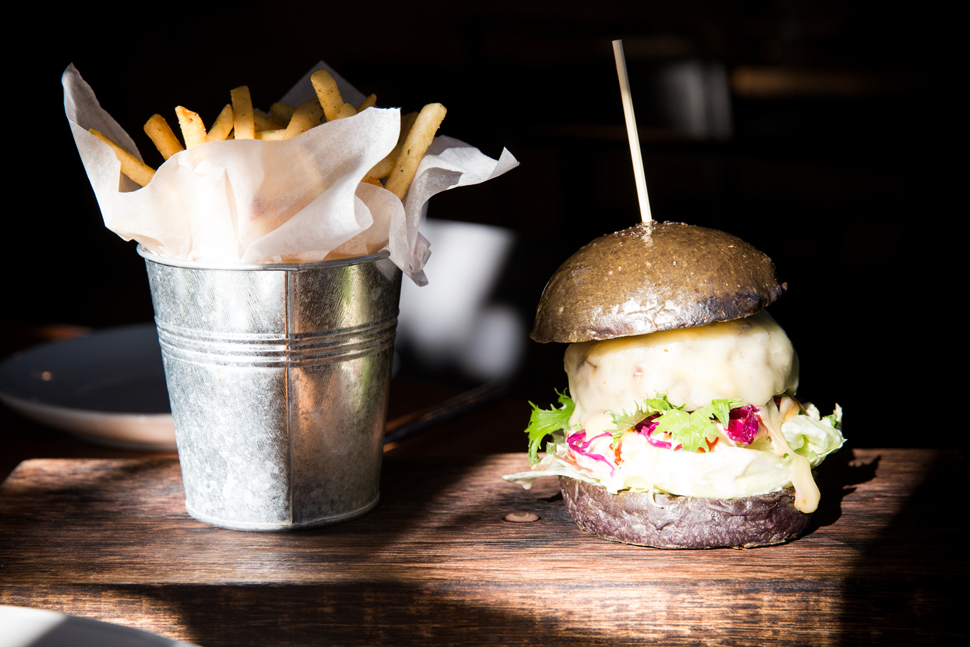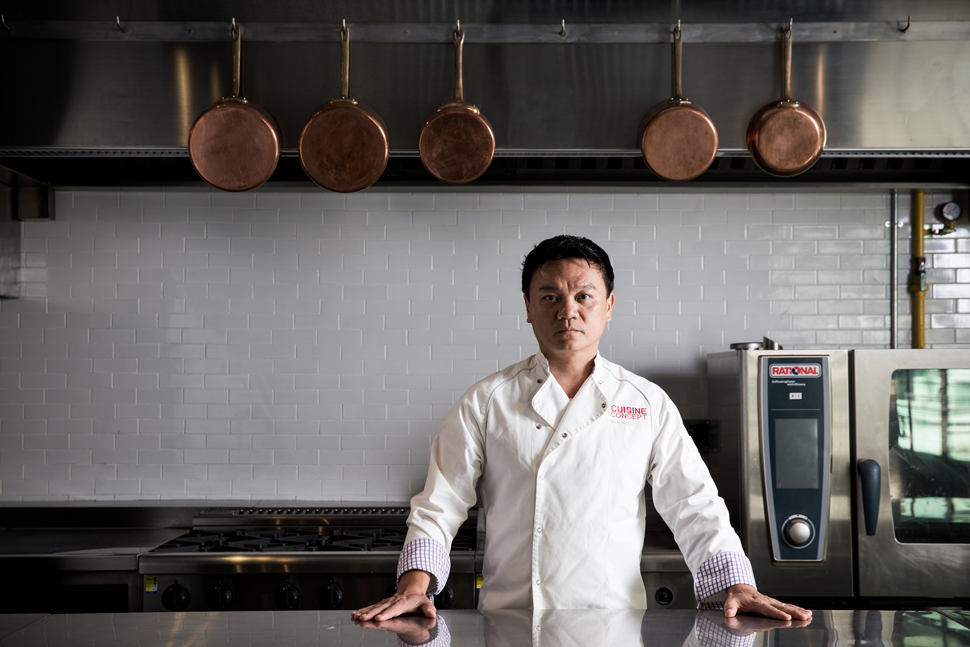
ตอนนี้เชฟเอียนทำอะไรอยู่บ้างครับ?
ถ้าร้านอาหารที่ทำอยู่ก็จะมี Hyde and Seek (ซอยร่วมฤดี) ร้านที่ 2 คือ Issaya Siamese Club (อยู่ที่ พระราม 4 ถนนเชื้อเพลิง ซอย ศรีอักษร) แล้วก็ร้าน Smith อยู่สุขุมวิท 49 ในอนาคตก็มี Hyde and Seek สาขา 2 ที่ Central World โซน The Groove น่าจะเปิดได้ตอนต้นเดือนพฤษภาคม แล้วในเดือนเดียวกันก็จะมีโรงเรียนสอนทำอาหาร Issaya Cooking school ที่ Central Embassy (ต่อเติมจากเซนทรัลชิดลม) อยู่ Ground Floor เลย อันนี้ผมร่วมทำกับ Sub Zero and Wolf เป็นแบรนด์เครื่องครัวของอเมริกา เค้าจะมาทำครัวให้แล้วเราก็เป็น Partner กัน ชึ้นไปชั้น 5 ก็จะทำคาเฟ่ด้วย ล่าสุดผมพึ่งเซ็นสัญญาที่ สีลมซอย 7 แต่อันนั้นน่าจะออกมาหลังสุด รวมๆเดือนพฤษภาคมมีเปิดอีก 3 ที่ เดือนมิถุนายนเปิดอีก 1 ที่ ก็ค่อนข้างที่จะหนักหน่อยครับ แล้วหลังจากเปิดร้านอาหารเสร็จเรียบร้อยหมดแล้วผมก็ต้องบินไป Stockholm กับการท่องเที่ยวแห่งประเทศไทย ไปสอนทำอาหารแล้วก็ทำ Dinner ให้ทานด้วยประมาณ 80 คน นอกจากเรื่องอาหารแล้วช่วงนี้กลับมาทำเป็นที่ปรึกษาหลังจากที่หยุดไปพักนึงบริษัท “Cuisine Concept” เป็นบริษัทของผมเอง ก็จะแยกออกไปคนละส่วนกับทำร้านอาหารครับ มีคุยกับลูกค้าที่กำลังจะเปิดโรงแรมอีก 2 ที่ มีทำที่กรุงเทพเจ้านึงแล้วก็ที่ภูเก็ตอีกเจ้านึง นอกจากนั้นกำลังมีดูอยู่ก็ที่อังกฤษ แล้วก็ดูไบ ตอนนี้กำลังคุยตกลงกันอยู่ครับ
อยากให้เล่าถึงร้านอาหารร้านแรกของเชฟเอียน?
ตอนนั้นมีคนอังกฤษเดินทางมาไหว้ขอพระพรหม เขาตามหา Partner ที่เป็นเชฟไทยไปร่วมงาน มากับซินแสด้วย เขาพักอยู่ที่โรงแรมโฟล์ซีซั่นซึ่งผมก็เป็น Executive Chef อยู่ที่นั่นเหมือนกัน แต่เรามารู้จักกันทีหลังผ่าน เพื่อนคนไทยของผม เขาชวนให้ไปทำอยู่ 2 ปี ตอนนั้นแม่บอกว่าผมโง่ เราเองมีรากฐานหน้าที่การงานดีแล้วก็ไม่รู้จะไปทำไม แต่ลึกๆคืออยากไปทำอาหาร ถึงอยู่กรุงเทพเค้าจ้างเรามาคุมคนก็จริงแต่เราอยากทำอาหารมากกว่า ก็เลยตัดสินใจลาออกเลยครับ แม่กับพี่น้องทุกคนก็บอกว่ามีรายการอาหาร แถมได้เป็น Executive Chef อยู่ในโรงแรม 5ดาว เป็นคนไทยคนเดียวในประเทศก็ว่าได้ (จนถึงทุกวันนี้ก็ยังไม่มีคนไทยได้รับตำแหน่งในโรงแรม 5 ดาว) ผมจำได้เลยแม่บอกว่า “มึงโง่ มึงจะไปทำไม คนรู้จักมึงทั้งประเทศ มีรายการโทรทัศน์ตั้งแต่ปี 2001 เป็นถึง Exclusive Chef ทำไมต้องไปลำบากไปเริ่มอะไรใหม่อีกทำไม” แต่ผมรู้ในใจว่าผมสนุกกับการทำอาหาร ก็เลยไปเปิดร้านอาหารไทยที่ New York ชื่อร้าน Kittichai Restaurant
ปรากฏว่าพอไปเปิดร้านที่ New York กลับมีคนไทยรู้จักเรามากกว่าตอนทำรายการในประเทศไทยซะอีก มันกลายเป็นว่าถ้าคนไทยหรือใครก็ตามที่ไปเรียนต่อที่นั่น ไม่ว่าจะเรียนทำอาหารโดยตรงหรือเรียนพวกเกี่ยวกับ Design ก็จะมาฝึกงานที่ร้านหมดเลย ตอนแรกผมรู้แค่อย่างเดียวคือเครื่องบินเคยบินชน World Trade Centerเท่านั้นเอง ผมไม่เคยรู้มาก่อนว่า Frank Sinatra เคยพูดถึงนิวยอร์กว่า “if you make it here, I’ll make it anywhere” คือบรรยากาศ New York มันเป็นแบบนี้อยู่แล้ว เราเจอแต่คนที่เข้ามาเพื่ออะไรซักอย่างที่จะประสบผลสำเร็จ ทุกคนที่นั่นจะมีจุดมุ่งหมายของตัวเองหมดเลย ทำให้ส่วนใหญ่มันเป็นงานที่ 2 ของเค้า เช่นอันแรกของเค้าอาจจะเป็นนางแบบ กำลังรอโมเดลลิ่งเรียกเข้าไป มันไม่ใช่งานที่เขามีใจอยากทำอยากเรียนรู้ขนาดนั้น ตัวผมเองก็เป้าชัดอยู่แล้วคือ ผมอยากไปทำอาหาร แค่นั้นเอง ผมไม่เคยคิดมาก่อนเลยว่ามันจะยาก การเลือกคนมาทำงานกับเราเลยเป็นเรื่องลำบากเหมือนกัน อเมริกาต่างกับยุโรป… อย่างที่ฝรั่งเศสเรายังได้เห็นคนตั้งใจอยากมาทำงานร้านอาหารอยากจะทำครัว อยากจะทำเสิร์ฟจริงๆ Sous Chef ที่อยู่ด้วยกันตอนนั้นก็บอกว่า คุณต้องจ้างคนประมาณ 80 คน คุณจะเหลืออยู่ประมาณ 12 คนที่อยากจะทำงานกับคุณ ก็ใช้เวลากว่า 6 เดือนกว่าจะ Adjust ในเรื่องการทำงาน เพื่อที่จะได้คนมาทำงานได้ถูกตำแหน่ง
เริ่มมี Practice การทำอาหารของตัวเองเมื่อไหร่?
ทุกคนที่เคยฟังสัมภาษณ์จะจำว่าผมช่วยแม่ขายแกงมาตั้งแต่เด็กๆ แต่ตอนนั้นไม่ได้ทำให้ผมอยากทำอาหารเลย เพราะว่ามันเป็นงานที่หนักมาก เราเห็นพ่อแม่ทำเองมาตลอดอยู่แล้ว ก่อนไปโรงเรียนทุกวันผมต้องขนแกงไปส่งให้แม่เป็นกิจวัตทุกๆ 365 วันต่อปีไม่มีวันหยุด “เพราะวันที่คนอื่นเค้าหยุดกันคือวันที่เราขายดีที่สุด” ผมเลยคิดว่าการขายแกงมันให้ผมในเรื่องสู้งาน พอโตขึ้นที่บ้านผมย้ายไปอยู่ออสเตรเลียกันหมด ผมเลือกไปอังกฤษเพราะคิดว่าถ้าตามไปอยู่ด้วยกันเหมือนเดิม ก็คงไม่ได้อะไรเยอะ ก็ไปเริ่มเรียนทำอาหารแต่ก็ยังไม่ได้คิดว่าอยากเป็นเชฟอยู่ดี จนมาช่วงอายุ 19 ที่ไปช่วยงานร้านอาหารของพี่สาว ผมได้อ่านพวกหนังสือ Biography ของเชฟดัง ได้เรียนรู้ว่าประวัติเขาเป็นยังไง ผมไม่เคยอ่านพวกตำราทำอาหารเลย เพราะอ่านแล้วไม่รู้เรื่อง ไม่รู้ว่าต้องเริ่มยังไง ต้องซื้ออะไรบ้าง ผมว่าตรงนี้น่าจะเป็นจุดประกายเรื่องยึดการทำอาหารเป็นอาชีพของผม เสร็จแล้วประวัติเชฟส่วนใหญ่ทุกคนต้องไปฝึกที่ร้าน Michelin Star เหมือนกับคุณอยากเป็นช่างภาพเป็นศิลปิน ถ้าผมอยากวาดภาพเก่งๆผมก็ต้องไปฝึกกับศิลปินชื่อดัง มันเป็นสิ่งเดียวกันกับการทำอาหาร ต้องศึกษาว่าเขาทำยังไง เขามีวิธีคิดแบบไหน ตลอดเวลาที่อยู่ต่างประเทศประมาณเจ็ดปี (ออสเตรเลีย 5 อังกฤษ 2) เลยเป็นช่วงเวลาผมสนใจแต่เรื่องการทำอาหาร ชีวิตประจำวันของผมมีแต่อาหาร ผมแทบจะตัดขาดจากประเทศไทยไปเลย กลับมากรุงเทพอ่านหนังสือพิมพ์ไม่รู้เลยว่าเขามีเหตุการณ์อะไรไปถึงไหน
แล้วมาค้นพบสไตล์ตัวเองตอนไหนครับ ที่เรารู้สึกเลยว่านี่คือเอกลักษณ์?
พอได้เป็นเหมือนกับ Sous Chef เหมือนตำแหน่งที่ได้ช่วยดูว่าจะต้องทำอาหารแบบไหนออกมา ก็เลยตั้งคำถามกับตัวเองเหมือนกันว่าสไตล์การทำอาหารของตัวเองเป็นยังไง ผมคิดว่าเอกลักษณ์การทำอาหารของผมมีอยู่สองอย่างหลักๆ แรกสุดเลยคือวัตถุดิบที่ใช้ต้องดี ต้อง “Great Quality” แล้วหลังจากนั้นก็ Cooking Simple แค่สองอย่างเท่านั้นเอง “Good Quality and Cook Simple” ผมว่ามันเบสิคมากๆ ถ้าเรามีครบทั้งคู่นี้โอกาสที่ผิดพลาดมันก็จะน้อยมากๆ นอกเสียจากว่าเราพยายามจะทดลองอะไรใหม่ๆ หลายคนเห็นผมในโทรทัศน์ดูเป็นเชฟที่มีกรรมวิธีการทำอาหารแปลกๆ นั่นเป็นอีกภาพนึง ( บางครั้งทำวิธีปกติมันไม่ทันในเวลา ) ถ้าลองสังเกตดูจะเห็นว่าร้านอาหารที่ผมเปิดในส่วนใหญ่จะเป็นแบบสบายๆอารมณ์ง่ายๆ ติดดิน Down to Earth ทุกอย่างที่นี่สามารถจับต้องได้ มากินอาหารที่นี่คุณจะอิ่มท้องโดยไม่ต้องไปกินที่ไหนต่อ โดยรวมร้านของผมจะเป็นแบบนี้เหมือนกันหมด ส่วนสาเหตุที่มีหลายร้านหลายแบบ ก็อาจจะเพราะโชคดีที่ผมทำอาหารได้หลากหลายประเภทล่ะครับ
เชฟเอียนมีวิธีคิดเมนูอย่างไรครับ?
จริงๆแล้วเวลาคิดเมนูผมเริ่มจากต้องศึกษาว่าจานที่เป็นประเพณี, Traditional หรือ Authentic Dish ของแท้มีที่มาที่ไปอย่างไร อาหารส่วนใหญ่เราเคยเห็น เคยชิม เคยทำ เราเคยรับคอนเซ็ปต์ตรงนี้มาหมดแล้วก็จริง แต่สมมุติถ้าบางจานเขาบอกว่ามีอายุ 120 ปีแล้ว ผมยังไม่เกิดเลย ผมไม่มีทางรู้ว่ารสชาติดั้งเดิมเป็นแบบไหนแน่นอน มีผู้ใหญ่ท่านนึงเคยบอกผมว่าแต่ก่อนอาหารไทยเนี่ยรสหวานมากแล้วก็มาเปลี่ยนเป็นเผ็ด เดี๋ยวนี้ทุกคนก็เลยคิดว่าอาหารไทยมันเผ็ดไปหมด ถ้าลองนึกดูธรรมชาติอาหารไทยก็มีหลายรส มากกว่าแค่รสเผ็ดจริงๆ ส่วนอาหารฝรั่ง Basic ของเขา การรับรสจะมีอยู่แค่สามรสชาติ พูดให้ถูกคือสาม Component สามองค์ประกอบมากกว่า อย่างที่รู้กันว่าฝรั่งเศสจะเป็นต้นตำหรับเลยที่คิดค้นเทคนิคการทำอาหารขึ้นมา จะมีอยู่ทั้งหมด 13 วิธี หุง ต้ม ทอด นึ่ง อบ อะไรก็แล้วแต่… ถ้าทำออกมามากกว่าสามส่วนก็จะเริ่มไม่รู้รสละ ยกตัวอย่างมีปลามาชิ้นนึงคนไทยกับฝรั่งก็ทำต่างกันแล้ว ของเขาคือเอาปลามา Pan Fried จี่บนกระทะ แล้วก็มีซอสสมมุติว่าเป็น Lemon Sauce ซอสเปรี้ยวก็ได้ เสร็จแล้วก็มีผักหรือมันฝรั่งวางเคียง แยกเป็นสามส่วนชัดเจน แต่ของไทยถ้าใกล้เคียงกันหน่อยคือทำปลานึ่งมะนาว ต้องทำปลาให้รสชาติเหมือนน้ำมะนาว พูดก็คือน้ำซอสต้องเข้าไปรวมในเนื้อปลา เหมือนกันกับทำแกงเขียวหวาน แกงพแนงหมูหรืออะไรก็แล้วแต่ รสชาติของแกงต้องเข้าไปในเนื้อ ทุกอย่างจะต้องเป็นอย่างนั้น ตรงนี้ด้วยความที่ผมเกิดเป็นคนไทยผมก็เลยเข้าใจได้
นอกจากเรื่องขั้นตอนการทำแล้ว เราต้องนึกถึงวัฒนธรรมการกินด้วย ต้องรู้ว่าอะไรที่คนชอบไม่ชอบ ผมเคยเปิดร้านอาหารที่สเปน ถ้าทำรสเผ็ดจะไม่มีใครกินเลย ที่นั่นคนเค้าไม่กินเผ็ด เค้ากินแค่ซอสพริกไทยดำเค้าก็บอกว่าเผ็ดแล้ว ผมบอกมันเผ็ดได้ยังไง นั่นคือผมเอา Culture ของตัวเองเป็นที่ตั้ง ซึ่งมันต่างกับเขา ถ้ายูยังเลือกจะทำอาหารเผ็ดต่อ ไอก็กินไม่ได้ สุดท้ายก็ไม่มีใครไปกิน เหมือนกัน ต้องรู้ว่าเค้าชอบกินอะไรด้วย ที่สเปนเค้าจะมีแต่อาหารทะเลทั้งนั้นเลย ถ้าขายแต่ซีฟู๊ดก็สู้ยาก หรือไปเปิดร้านอาหารที่มุมไบ (อินเดีย) 60 เปอเซนต์ของคนที่นั่นกินมังสวิรัติ (Vegetarian) กันหมด ถ้าอยู่ๆไปเปิดร้านอาหารที่มีแต่เมนูเนื้อ ยูเจ๊งแน่นอน ไปมุมไบก็เลยต้องใช้ผักเยอะๆ เพราะฉะนั้นผมว่าคีย์สำคัญคือ เราต้องรู้ว่าอยากทำอะไรและทำให้ใครกิน ไม่ว่าจะอยู่ที่ไหนก็แล้วแต่เราต้องรู้จักลูกค้าของเรา ต้องศึกษาไม่งั้นมันก็จะลำบาก อันนี้เป็นไอเดียในการคิดเมนูของผมคร่าวๆครับ
สิ่งที่ยากที่สุดในการทำร้านอาหารคืออะไรครับ?
สิ่งที่ยากที่สุด… น่าจะมีหลายกรณีเลยครับ ผมคิดว่าอย่างคร่าวๆก็มีสิบสิ่ง ที่เปิดร้านอาหารใหม่แล้วต้องเจอแน่นอน ไล่ไปเลยไม่ว่าจะเป็น หนึ่งเรื่องปัจจัยความพร้อมต่างๆของเรา สองเรื่องความพร้อมเพรียงและระเบียบวินัย สามเรื่องการดูแลบริหาร สี่คอนเซ็ปต์หรือสไตล์ของร้าน ห้าทำเลที่ตั้ง Location หกงานบริการหรือ Service เจ็ดคือสิ่งที่อำนวยความสะดวกให้เรา เช่น บางทีทุกอย่างดีหมดแล้วแต่ไม่มีที่จอดรถ นั่นก็เป็นส่วนหนึ่งที่สำคัญ แปดการทำอาหาร ต้องดูด้วยว่าลูกค้าเก็ตในสิ่งที่เราทำรึเปล่า บางอย่างอาจจะเร็วเกินไป คนตามไม่ทัน เขาอาจจะไม่เก็ตในสิ่งที่เราทำก็ได้ สมมุติผมอยากทำ “Tapas” โอ้โห มันเป็นจานที่ใครในโลกเคยคิดมาแล้วก็จริง แต่ทำที่กรุงเทพฯยังอาจจะเร็วเกินไป บางทีลูกค้ายังไม่เข้าใจว่า ทำไมอาหารเสิร์ฟมานิดเดียว มันคือการแบ่งสันปันส่วนกันมื้ออาหารของบ้านเรา มากันหกคนอาหารมาแค่สามชิ้นก็เลยต้องสั่งสองที่อะไรแบบนี้ เพราะฉะนั้นข้อที่แปดจริงๆแล้วมันคือการติดต่อสื่อสารการให้คอนเซ็ปต์กับลูกค้า เราต้องอธิบายให้เขาเข้าใจ ข้อที่เก้าผมให้ความสำคัญกับเรื่องการเงินการบัญชี เพราะว่าเราต้องรู้จักการบริหารทั้งหน้าบ้านและหลังบ้านเกี่ยวกับเรื่องเงินถ้าดูง่ายๆรายได้น้อย รายออกเยอะ มันก็อไม่สมส่วนไม่สมดุลกัน สุดท้ายอย่างที่สิบ ผมคิดว่าเหนือกว่าทั้งหมดทั้งปวงคือ พื้นฐานเราต้องมีใจบริการก่อน ทุกคนในร้านตั้งแต่หน้าร้านเดินเข้าร้านมายันไปถึงในครัว หรือแม้แต่ตัวเชฟเจ้าของเองต้องมี Service Mind เพราะถ้าไม่มีใจให้ตรงนี้ทุกอย่างก็คงทำลำบาก
ทั้งหมดที่กล่าวมา สำหรับเชฟคิดว่ามันเกิดขึ้นได้อย่างไรครับ?
จากการเรียนรู้ครับ ผมคิดว่ามันน่าจะเป็นบทเรียนที่ค่อนข้างจะแพงพอสมควรเลยทีเดียว ถ้าสมมุติเรียนรู้แบบผิดๆก็จะไม่ได้อะไร ทุกวันนี้ผมก็ไม่ได้วิเคราะห์ด้วยตัวเองว่าหนึ่งถึงสิบมันดีหรือเปล่านะครับ ผมพยายามมองจากภาพรวมว่ามัน Profitable หรือเปล่า พอเราก้าวมาทำธุรกิจด้วยแล้ว เราไม่ได้ทำเพียงเพราะเราอยากทำตามอำเภอใจ ปัจจัยที่มีให้ใช้จ่ายผมก็ไม่ได้มีถึงขนาดนั้น ก็ต้องมี Partner หลายคนอยู่เหมือนกัน คนนึงอาจจะจะบริหารเรื่องเงิน อีกคนอาจจะดูเรื่องเครื่องดื่ม ตัวผมเองก็จะโฟกัสเกี่ยวกับอาหาร เราจะแบ่งแยกงานกันทำ แล้วในวันสุดท้ายก็ต้องมาดูเรื่องการจับจ่ายให้พนักงาน ทำยังไงให้พนักงานมีความสุข เพื่อต้องการที่จะให้เข้าอยู่กับเราไปนานๆ
เทรนด์ของวงการอาหารตอนนี้เป็นอย่างไรกันบ้างครับ?
ผมว่าหลักเลยๆ สำหรับผมมันคือเรื่องของความ Sustainable (แนวคิดแบบยั่งยืน) ครับ ตอนนี้เรากำลังรวมกลุ่มเชฟที่เป็น Free Standing Restaurant กัน (เชฟที่แยกออกมาทำร้านอาหารเองไม่ขึ้นอยู่กับโรงแรม) เป้าหมายคือต้องการที่จะรักษาสภาพแวดล้อมของโลก ถ้าปัญหาที่ชัดๆเลยตอนนี้คือปลา Bluefin Tuna มันกำลังจะสูญหายไปจากโลก กลุ่มเราก็จะเลือกใช้ปลาชนิดอื่น หรือถ้าใครเคยไปทำอาหารที่ประเทศอังกฤษจะรู้ดี ผมเคยไปที่นั่นเค้าจะไม่ยอมให้ใช้พริกแกงที่ทำจากบ้านเรา เพราะเขามองว่าในพริกแกงมีกะปิ การที่กะปิใช้กุ้งตัวเล็กใช้กุ้งฝอยทำเป็นการฆ่าวงจรชีวิตของกุ้ง มันไม่ Sustainable ถ้ายังอยากใช้กะปิวิธีคือผมต้องไปหากุ้งใหญ่มาทำ เพราะฉะนั้นสูตรอาหารบางอย่างก็เลยต้องมีปรับเปลี่ยนบ้าง บางสิ่งที่สมัยก่อนทำตามๆกันมาก็ต้องมาคิดอีกทีว่าเราจะปรับเปลี่ยนส่วนผสมไปเป็นแบบไหน ตอนนี้ที่รณรงค์ก็รวมกันได้ประมาณกว่าสิบห้องอาหารแล้ว ก็คิดว่าแนวโน้มคงจะมากขึ้นเรื่อยๆครับ ทั้งนี้การเลือกวัตถุดิบนอกจากจะต้องคำนึงถึงความยั่งยืนแล้ว หลังๆนี้สิ่งที่ผมสังเกตุเห็นทั้งบ้านเราและทั่วโลกเลยคือเน้นความสดใหม่ ความ Organic แบบชนิดที่สั่งตรงจากฟาร์ม “Farm to Table” เลย เดี๋ยวนี้จะให้เชฟไปเดินชอปปิ้งในตลาดตอนเช้าคงหาได้น้อยแล้ว ถามว่าการเดินตลาดตอนเช้าคุณได้เลือกของดีแน่นอนล่ะ แต่คุณไม่มีทางรู้เลยว่าของมาจากไหน ผมรู้จักร้านที่ฝรั่งเศสมีร้านนึงเค้าจ้างคนขึ้นรถไฟ นั่งสองชั่วโมง เพื่อเอาผักมาส่งให้เค้าทุกวัน ซึ่งค่าขนส่งมันคงต้องแพงมากๆล่ะ แต่เขาก็ยอมแลกเพื่อได้ผักที่สดกว่าร้านอื่น
ทุกวันนี้ปกติเชฟซื้ออาหารทานข้างนอก หรือทำเอง?
ส่วนใหญ่ผมกินง่ายๆครับ อาจฟังดูน่าเบื่อหน่อย มื้อเช้าผมจะทานนมถั่วเหลือง (เพราะทานนมจากสัตว์ไม่ได้) คู่กันกับพวกซีเรียลผลไม้ ทานคู่กันแบบนี้แทบจะทุกวันเลย ผมเป็นคนกินอะไรเหมือนเดิมทุกๆวัน จริงๆเห็นของอื่นแล้วยังอยากกินนะ แต่มันรู้สึกอิ่มอยู่ตลอดเวลา มันติดเป็นนิสัยอย่างนึงไปแล้ว ที่ก็ไม่รู้ว่าเป็นเรื่องดีหรือไม่ดีเหมือนกัน เมื่อกี้นี้ก่อนออกมาจากบ้าน ภรรยาก็ถามว่าเย็นนี้อยากกินอะไร ผมบอกไปว่า “สลัด (Salad)” เค้ามีผักขมกับฟองเต้าหู้อยู่ แล้วส่วนใหญ่เวลาเค้าผัดเค้าจะไม่ใส่ซอสอะไรเลย จะใช้เกลือผัดแล้วน้ำของผักจะออกมาเอง จานนีั้หลักก็มีโปรตีนกับวิตามิน ผมกินแค่นี้ก็พอแล้ว คือการทำงานอยู่ในครัวมันเสียอย่างนึงคือร้อน พอร้อนแล้วจะทำให้ไม่อยากจะกินอะไร ไม่ได้ไม่สบายตัวนะ แต่มันไม่มีความรู้สึกที่อยากจะนั่งแล้วก็สั่งอาหารแล้วก็ทาน ถ้าจะกินก็ต้องเป็นวันที่ว่างจริงๆ
ถ้ากินน้อยขนาดนี้ เชฟมีวิธีฝีกการรับรู้รส (Chef’s Palate) ของตัวเองอย่างไร?
ของผมหลักๆคือต้องเดินทาง เดือนนึงอาจจะครั้งสองครั้งแล้วแต่ ไม่ว่าไปที่ไหนผมจะมี List ของผม ว่าตอนนี้เชฟประเทศนี้แต่ละคนทำอาหารยังไงบ้าง ก็จะโฟกัสไปที่ร้านนี้ ร้านนี้ มีทั้งร้าน Local ที่ทำอาหารต้นตำรับดั้งเดิม แล้วก็ร้านที่ทันสมัย สมัยใหม่ อีกร้านนึงที่ผมให้ความสำคัญเลยคือร้านที่กำลังเป็นที่พูดถึง นอกจากจะไปชิมอาหารของแต่ละร้านแล้ว ทุกวันนี้ผมยังอยากเข้าไปฝึกทำงานในร้านที่มีชื่อเสียงเหมือนเดิมอยู่ตลอด ทุกๆปีจะพยายามบังคับตัวเองเลย ว่าต้องหาโอกาสเข้าไปทำ แต่ลำบากตรงที่อยู่อาทิตย์นึงคงไม่ได้ ได้หนึ่งถึงสองวันเนี่ยเต็มที่ละ อีกอาทิตย์นึงข้างหน้านี่ก็กำลังจะไปฝรั่งเศส ผมบอกเพื่อนที่มี Connection ว่าอยากเข้าไปทำในร้าน “Pierre Gagnaire” ดู (ร้านในปารีสของเชฟเพีย กาเนียร์ อันโด่งดัง) ถ้าเป็นไปได้ขออยู่ที่นั่นซักประมาณสองวัน นอกจากเรื่องการทำ การรับรู้รสแล้ว ผมอยากเข้าไปดู Service เข้าไปดูสิ่งที่ ถ้าเค้าทำผิดเราจะได้เห็นเป็นบทเรียนแล้วไม่ทำตาม หรือสิ่งที่เค้าทำแล้วมันดีสำหรับแขก ก็จะได้เก็บมาใช้กับร้านเราเอง
ทุกวันนี้หนึ่งวันของเชฟเอียนทำอะไรบ้างครับ?
ทุกวันของผมเป็นเหมือนการเริ่มต้นใหม่ของตัวเอง เริ่มต้นในที่นี้หมายถึงว่าเราไม่รู้ว่าเหมือนกันอะไรจะเข้ามาบ้าง ผมไม่เคยเคิดว่าตัวเองประสบความสำเร็จ หรือ Successful แล้ว ผมยังต้องพยายาม ยังต้องเรียนรู้อะไรใหม่ๆอยู่ทุกวัน ไม่ว่าจะเป็นงานด้าน Consulting หรือการเปิดร้านอาหาร ที่เล่าไปตอนแรกว่ากำลังจะเปิดอีกสี่ร้านภายในสองเดือน ผมไม่เคยเปิดสี่ห้องอาหารในเวลาสองเดือนหรือเดือนเดียวกันมาก่อน เพราะฉะนั้นผมต้องทำตัวให้พร้อม วันๆนึงเนี่ยบางคนเห็นผมเป็นแบบนี้สงสัยว่ามีเวลานอนกี่ชั่วโมง หลังจากคุยกันวันนี้เสร็จเรียบร้อยผมมี Meeting ต่อ สำหรับครัวใหม่ที่กำลังจะเกิดขึ้น ต้องเรียกวิศวกรเข้ามาคุยว่าทำไมครัวผมถึงเป็นแบบนี้ ผมทำงานแบบนี้ไม่ได้ พอเสร็จแล้วเดี๋ยวผมก็มีคนจาก Idea Magazine ประเทศอังกฤษเข้ามาสัมุภาษณ์ต่ออีก ตามปกติช่วงระหว่างตั้งแต่หกโมงเย็นเป็นต้นไป เป็นช่วงที่ผมต้อง Stand-By อยู่ที่ร้านทุกวันอยู่แล้ว ต้องทำอาหาร ต้องมีการสื่อสารกับพนักงานของผมไม่ว่าหน้าบ้านหรือหลังบ้าน และช่วงหลังมานี้ต้อง Present ตัวของผมเองเยอะขึ้นเหมือนกัน พอร้าน Issaya ติดใน Top 50 มันก็กดดันเหมือนกัน หลายคนที่มาทานอาหารเขาต้องการให้เราโชว์ตัว มาเห็นตัวว่าร้านนี้เป็นของเชฟคนนี้นะ จริงๆเราแฮปปี้มากกับการที่อยู่ในครัว ได้ Create อาหาร ร่วมกันกับพนักงาน พอโดนดึงตัวออกไปปึ้บ มันเหมือนกับว่า เห้ยไม่ได้นะ เรากำลัง Servicing อยู่ หลายคนเวลาเจอผมก็จะบอกว่า วันนี้โชคดีมากๆเลยที่ได้เจอเชฟเอียน แต่ก็ไม่ได้หมายความว่าทุกครั้งที่มาร้านอาหารไม่เคยเจอนะ เพราะผมอยู่หลังร้านตลอด (หัวเราะ) พอต้องเจอกับคนมากมายวันของผมมันเลยเหมือนวันใหม่ทุกวัน เมื่อวานนี้เจอใคร จะโกรธทะเลาะหรืออะไรกับใครก็แล้วแต่มันจบไปเรียบร้อยละ นี่คือวันใหม่ของเรา ทุกวันของผมเป็นวันทำงานได้ทั้งหมด
แล้วนอกจากเรื่องทำอาหาร เชฟเอียนมีกิจกรรมอะไรที่กำลังสนใจเป็นพิเศษอีกบ้าง?
ตอนนี้หลักๆก็คือต้องดูแลรักษาตัวเองครับ ตอนนี้ผมกลับมาว่ายน้ำใหม่ อายุเราเยอะขึ้น การย่อยอาหารก็ทำงานช้าลงให้ผมไป Gym ผมรู้สึกว่ามันไม่เหมาะกับตัวเอง มันทำให้เรายิ่งกินเยอะ ต่างกับว่ายน้ำแล้วรู้สึกดีขึ้น ถ้ามีเวลาก็จะว่ายน้ำทุกวัน ส่วนใหญ่งานผมจะเริ่มช่วงบ่ายเป็นต้นไป ช่วงเช้าก็เลยได้ออกกำลังกาย แล้วก็ได้เช็คอีเมล์กับคนที่ทำงานด้วยกันเล็กๆน้อยๆ โดยรวมมันก็วนกลับมาเกี่ยวกับเรื่องอาหารล่ะครับ ต้องเตรียมตัวให้พร้อมกับร้านที่กำลังจะเปิดนี้ ถ้ามีนอกจากเรื่องงานคือต้องให้เวลากับครอบครัวด้วย ถึงแม้เราคิดว่าเราทำงาน 24 ชั่วโมง แต่เราต้องหาเวลาเจอกันให้ได้ ผมคิดว่าเรื่องนี้ก็สำคัญเหมือนกัน ที่บ้านผมมีพี่น้องทั้งหมดเจ็ดคน ตอนนี้ก็แยกย้ายอยู่กันทั้งสิงคโปร์ ยุโรป ออสเตรีเลีย ไม่ว่าจะไปที่ไหนเนี่ยผมมีญาติอยู่หมดเลย ตอนนี้พี่สาวคนนึงอยู่ไทย ผมก็บังคับตัวเองว่าผมต้องเจอเค้าอย่างน้อยเดือนละครั้ง เราจะคุยโทรศัพท์กันยังไงอันนั้นอีกเรื่องนึง ไม่ว่ายังไงเราต้องนั่งกินอาหารด้วยกัน อันนี้ต้องแบ่งเวลางานให้ได้เลยครับ
สุดท้ายนี้เชฟเอียนมองเรื่องการได้ Ranking หรือ พวก Michelin Star กับอาชีพตัวเองไว้อย่างไร?
เรื่องการให้ Ranking ผมคิดว่ามันดีเหมือนกัน ในแง่ว่ามันทำให้เชฟต้อง Keep Standard รักษามาตรฐานของตัวเองไว้ แต่ก็มีสำหรับบางคนที่เขาไม่ต้องการ Michelin Star เพราะว่าเค้าไม่ได้สนใจ Condition เหล่านั้น อย่างที่ผมรู้จักเป็นเชฟในอังกฤษ เค้าได้มาสองดาว เค้าบอกเค้าไม่ต้องการ เค้าคืนให้ มันก็เป็นความคิดส่วนตัวของแต่ละคนต่างกันไป ส่วนตำแหน่ง Ranking “Asia’s 50 Best Restaurants 2014” ที่มอบให้ร้าน Issaya Siamese Club ก็ดีครับ แต่เขาไม่ได้วัดว่า Service ต้องเป๊ะ ต้องทำแบบนี้ๆ เขาดูจากว่าคุณมีจุดเด่นจุดแข๊งอะไร แล้วใช้ในการพิจารณา เราไม่ได้คิดว่าจะได้ แต่ถ้าถามสำหรับผมเองการมีคน Recognize เรา ต้องการให้อันดับตรงนี้เรามันดีก็จริง แต่ผมไม่คิดว่าการจัดอันดับมันไม่ใช่เรื่องที่เกิดขึ้นแค่วันเดียว คุณตื่นลืมตามาปุ๊ปจะเป็นซุปเปอร์สตาร์ มันเป็นไปไม่ได้ สำหรับผมสิ่งที่สำคัญคือคนที่ทานอาหารเรา แล้วเค้าบอกว่าชอบอาหารเรา… ก่อนหน้านี้ผมบินไปเชียงใหม่ ไปกับทีมอีกสามคน ต้องไปทำ Chef Tableสำหรับ 40 คนเลย ผมมีเวลาเตรียมการก่อนหน้านั้นอยู่วันครึ่งและมีเตาอยู่เตาเดียว ทำอาหารทั้งหมด 11 อย่าง พอทำเสร็จแขกที่มาชิมเป็นคนฝรั่งเศสบอกว่า เขาหาอาหารแบบนี้ทานที่ฝรั่งเศสก็ยังไม่มี หมายถึงว่าอาหารจานนี้เนี่ยดีมากกว่าที่ฝรั่งเศสซะอีก เป็นคำชมที่ได้ยินแล้วผมมีความสุขมากๆเลย อีกคนนึงบอกว่าอาหารนี้เป็นอาหารที่ดีที่สุดที่เค้ากินมา “The best meal I ever had for a long long time” ซึ่งคำว่า long long time ความหมายอาจจะเป็นสิบปีก็ได้ ทุกครั้งเวลาเราได้คำชมอย่างนี้จากแขกเท่านั้นเอง ผมไม่ได้หมายถึงว่าผมเป็นคนเก่งนะ แต่ผมพยายามให้ทุกจานที่ผมทำ เป็น Best of the best ที่สุดของที่สุดแล้ว เพื่อต้องการที่จะให้ลูกค้าเนี่ยได้รู้สึก ได้ลิ้มรสชาติ ให้เค้าได้เห็นถึงสิ่งที่เราใส่ไว้ลงไปในอาหาร ในทุกๆจานผมให้หมดทั้งชีวิตของผมเลย ผมคิดว่าตรงนี้อาจจะให้ความสุขแก่ผมมากกว่าการที่ผมได้ Ranking ซะอีก
_________________________________________________________
Where are you in your career at the moment?
For restaurants, right now I have Hyde and Seek (in Soi Ruamrudee), Issaya Siamese Club (in Soi 4 Soi Sri Aksorn, Chua Ploeng Road), and Smith (at Sukhumvit 49). In the future Hyde and Seek will have its second branch at The Groove in Central World, which should be ready to open around early May. In the same month, I will be opening a cooking school called, Issaya Cooking School at G floor, Central Embassy, which I’ve partnered with Sub Zero & Wolf, a cooking appliances brand from the US. Also, I’ll be opening a café on the 5th floor of Central Embassy, and I’ve just signed a contract to open a restaurant at Silom Soi 7. So all in all, there will be three new restaurant openings in May, and another one in June, so it is pretty hectic. After these new restaurant openings, I’ll be flying to Stockholm with the Tourism Authority of Thailand to teach cooking lessons and prepare dinner for about 80 people. Apart from the restaurant business, I’ll be a consultant for my own company called, “Cuisine Concept”, plus right now I’m talking to clients about opening two new hotels, one in Bangkok and another one in Phuket, and I’m also eyeing London and Dubai for my abroad locations.
Can you tell us about your first restaurant?
Back then there was this English guy who traveled to Bangkok to see his prayers at the Erawan Shrine with one other Chinese fortune teller to find a Thai chef to work with him abroad. He stayed at the Four Seasons hotel where I was the Executive Chef at the time. But I got to know him later through a Thai friend of mine, and he said he wanted me to go work with him abroad for two years. My mother said I was stupid, that there is no reason for me to go as I’ve already had a stable career here in Thailand. But deep down inside, I knew I wanted to cook even though I already had job here as an Executive Chef. So later I decided to quit my job. My mother and everyone in my family said to me that I already have my own cooking show, plus I was the only Thai who get to work as an Executive Chef in a five-star hotel, why do I have to go through all the trouble and start over? But I knew for a fact that I’m into cooking, so I went to New York and opened my Thai restaurant called, “Kittichai Restaurant”.
It turns out that when I opened this restaurant in New York, there were people who knew me even more compared to the people in Thailand. It also turns out that everyone who studied abroad there, from cooking to design and what not, wanted to have part-time jobs at my restaurant. I didn’t really know much about New York at the time, apart from the 9/11 incident. I didn’t even know the Frank Sinatra’s song, “New York, New York”, where he sang, “if you make it here, I’ll make it anywhere.” What I’m trying to say is, everyone in New York is competing to succeed, and everyone has their goals set in mind. So the jobs at my restaurant for most people were their second jobs. For example, this girl might be a model who’s still waiting for the model agency to call her. So obviously she’s not going to be that enthusiastic to learn and grow in this business. I also have my own goal, which is to cook, that’s all. I’ve never thought that hiring someone to work for me would be difficult. America is different to Europe…like in France, there are actually people who wants to work in restaurants to cook, and to serve. A sous chef who I worked with at the time told me that I have to hire around 80 people to at least get 12 people who want to work for me. I spent around 6 months to get adjusted in the business in order to get the right people for the right positions at my restaurant.
When did you first get your practice in cooking?
I helped my mother selling food since I was a little boy, but at the time it didn’t make me want to get into cooking at all, because it was always so tiresome. I’ve seen my parents doing it ever since I can remember. Everyday before I go to school I had to help my mother get the food and pots and pans ready, 365 days a year, without having any holidays. My mother said to me, “The days that other people are on their holidays, will be the days where we can earn lots of money.” So I think by helping my mother as a child has made me to become a hard worker. As I grew up, my family all moved to Australia, but I chose to go to England, because I thought that if I follow them along, everything would be the same as before. So I started to learn how to cook, but didn’t think of becoming a chef right away. Until I was around 19 years old that I got to help my sister with her restaurant. I also started reading biographies of famous chefs because I wanted to learn more about their background. I never read any cookbooks because I couldn’t understand the recipes, I didn’t know where to start, or what ingredients to buy. I think at this point, I wanted to cook as a professional career. I also found out from most of the famous chef’s backgrounds that they all had to intern at a Michelin Star restaurant at the starting point of their career. It’s like when you want to become a photographer or an artist, if you want to get better at your drawings, you have to train yourself with a famous professional artist. The same thing goes to cooking, you have to study about their work ethic and their ideas. Therefore, all those times I lived abroad for seven years (5 years in Australia, and 2 years in England) I have been very into cooking. My day-to-day life there was all about food. I kind of cut myself off from Thailand completely, when I came back here I didn’t have a clue what was going on in the newspapers.
So when did you discover your own cooking method?
When I was in a position similar to a sous chef, where I had to help come up with the dishes to be presented, I started asking myself, “what is my personal style of cooking?” I think my cooking method is firstly, the ingredients have to be of “great quality”, and secondly, just cook simple, that’s all. I think this is really basic, if you have these two factors of cooking, the chance that things will go wrong is very slim. Except if you want to experiment with new things, of course. Many people who see me in TV would probably all think that I have a weird method of cooking. But that’s just another image. (He used different techniques to compete with the time) If you look closely, you will see that most of my restaurants have a chilled out, down to earth atmosphere, something that people can really relate to. If you come to my restaurants, you will be so full that you don’t have to go eat anything elsewhere afterwards. So yeah, most of my restaurants are like that. And the reason that I have many restaurants with different styles is perhaps I can cook different styles of food.
How do you come up with the dishes?
Whenever I have to come up with the menus, I always start out by studying the traditional way of living or authentic dishes. Even though I know some of these concepts from most of the food I’ve seen, tasted, and cooked, but what if this one particular dish has lasted for around 120 years? I wasn’t even born yet! It’s impossible for me to know the exact original taste. An elder once told me that Thai food used to have a really sweet taste, but has later changed to more spicy. So nowadays everyone think that most Thai food is spicy, but if you really think about, the nature of Thai food has many different tastes. As for western food, they have three basic components. As you know, France is the origin of discovering their cooking techniques, which consist of thirteen methods; boiled, fried, steamed, baked, and so on. If the dish has more than three components, then you won’t really know the right taste. For example, the technique for cooking a fish for the Thais and Westerners is already different. For them it is pan fried, with lemon sauce and vegetables next to the fish on a dish, clearly arranged into the three components and that’s it. Whereas for the Thais, a similar dish would be steamed fish in lemon sauce. The fish has to taste like the lemon sauce, or to put it in a different way, the sauce has to be soaked in the fish. The same thing goes to “Kaeng Kiew Wan” or green Thai curry. The taste of the curry has to be absorbed into the meat.
But apart from the cooking methods, I also have to keep in mind the different eating cultures, I have to know what people like and dislike. I used to open a restaurant in Spain, where people won’t eat any of the spicy dishes, because Spanish people don’t eat spicy food. Even just the simple black pepper sauce, they already said it’s spicy. I was like, how can that be spicy? But at the time, I was only thinking about my Thai eating culture, which is totally different to theirs. “If you still continue to cook spicy food, then I simply can’t eat it”. The same thing goes to what they like to eat. There are tons of seafood in Spain. If I only cook seafood, then it would be hard for me to standout and compete. Or if I open a restaurant in Mumbai, India, 60% of the people there are vegetarian. If out of nowhere I open a restaurant that only sells meaty dishes, then of course I’ll be out of business. Therefore, I think the key is to fully understand what you want to cook, and for who to eat. Wherever you are, you have to know your customers, you have to study their culture, or else you’ll have a hard time. So that’s basically how I roughly come up with my menus.
What is the most difficult thing in running a restaurant?
I have to say there are many aspects to it, roughly around ten. What you will definitely have to go through are; one, whether you are ready to commit to it. Two, how disciplined you are. Three, how you manage the restaurant. Four, the concept or the style of the restaurant you come up with. Five, location. Six, service. Seven, the facility that will be provided for you, for example, everything is going well so far, but you realized the parking space is not good. Eight, coming up with the dishes and menus; you have to be careful whether your customers get what you are cooking or trying to present. Some dishes may be too modern, or too unfamiliar to them, so they might not be able to keep up. Like “tapas”, I mean, obviously someone in this world has come up with it, but maybe Thai people are not fully acquainted to it yet. Sometimes the customers don’t understand why some dishes come in such small portions. They come in a group of six, but the food comes in just three pieces, so they have to order a second dish, that kind of thing. Therefore, number eight is actually about being able to communicate with your customers. Nine, I give importance to the finance, because you have to know how to be good at managing the money that goes in and out of the business. And last, number ten, which I think is the most important one of all, is that you have to be service minded. Everyone from waiters, bartenders, to even chefs have to have a service mind, because if you don’t have it then everything will be very difficult.
From everything you have listed out, how have you managed to achieve them?
It’s by learning from your experience, which I think is quite a valuable lesson. Until now, I still haven’t analyzed myself whether number one to ten is good or not. But I’m trying to look as a whole whether the business is really profitable. When you have your own business, you cannot just do everything you desire. I also have a limit on how much I can spend as well. That’s why I have quite a number of partners that work with me. One of them might be managing the finances, another might be taking care of the beverages, whereas I focus on the food. And in the end, we have to take care of our staffs, making sure they are happy, so they will be with us for many years.
What trends do you foresee in the cooking business?
I think being sustainable is important. Right now we are gathering a number of chefs from free standing restaurants for the purpose of building awareness about our environment. One of the most critical problem right now is that the Bluefin Tuna is about to extinct. Knowing this, we chose to use other fishes instead. Any chefs who have been to England would know best, because they won’t let you use the “kapi” (shrimp paste) from Thailand, as they see that it is made from tons of small shrimps. So in order to make kapi, you have to kill all these small shrimps, which will affect their cycle and inevitably the food chain. If I want to use kapi there, then I have to find big prawns instead. Therefore, some of the recipes have to be altered a bit, or for those authentic, original recipes, I also have to think of ways to make it more sustainable. Right now around thirty restaurants have joined our awareness group, so I think this is heading towards a good direction. Apart from being sustainable, I’m seeing lots of restaurants in Thailand and abroad are giving importance to the “organic” ingredients, like “from farm to table”, that sort of thing. Nowadays it is very rare for chefs to shop for ingredients at morning markets. Of course, you would find great products there, but you would never know where they’ve come from. I know a restaurant in France, where they hire a person to get on a train for two hours to go to a farm, in order to get back the freshest vegetables. The transportation cost is definitely expensive, but they are willing to get the best vegetables compared to other restaurants.
Nowadays do you cook your own food to eat, or do you buy from someplace else?
Mostly, I eat very simple. This may sound boring, but every morning I drink soy milk along with cereal and fruits. I tend to eat the same things everyday. I do want to eat different dishes when I see one, but I feel full all the time. I guess it’s a habit of mine. This morning before I left the house, my wife asked me what I want for dinner, and I said “salad”. We already have spinach and tofu at home, so my wife would fry them up without adding any sauce, just add a little salt instead, and the juices from the vegetables would come out. So mainly there will be protein and vitamins. That’s already enough for me. The downside in cooking is that I have to be in the hot kitchen most of the time, and when it’s hot, I don’t feel like eating much. It’s not that troublesome, it’s just that I don’t feel the need to sit and order food to eat. If I have to do that, then it means I have to be completely free that day.
If you eat very little like you said, then how do you exercise your taste palettes?
Mainly it’s from my travels. I may have to travel 1-2 times a month. No matter where I go, I’ll have a list with me that say which methods of cooking the chefs from this particular country are doing. So when I get there, I’ll focus on different restaurants, from the local restaurants that cook authentic dishes, to the modern restaurants with a new style of cooking. But most importantly, I’ll be focusing on the restaurants that are becoming popular among the locals. Apart from tasting the food among these restaurants, I still always want to practice my cooking in the popular restaurants until today. So every year I’ll try to control myself to go practice whenever I have the chance. But the problem is I can’t stay up to a week, but for only 1-2 days maximum. For example, if I go to France, I’ll tell my friends who have connections that I want to work in “Pierre Gagnaire” for about two days if possible. Apart from the cooking and learning new tastes, I also want to go in and see their service, what they do right and wrong, so I can apply what I learn when I come back to Thailand.
Can you tell us what you normally do in a day?
Everyday is like a new start, as in I also don’t know what each day would bring me. I never consider myself as a successful person. I still have to try hard, learn new things everyday, whether it’s for my consulting job, or for my restaurant openings. In the beginning I told you that I’m about to open four new restaurants within two months, which I’ve never done before in such a short period of time. Therefore, I always have to be ready. Seeing me as always being busy, some people might want to ask me how many hours of sleep do I get? After this interview, I have another meeting to attend with the engineers about building my new kitchen. After that, I’ll be having an interview with Idea Magazine from England. So normally around 6 p.m. onwards I have to stand-by at the restaurants everyday, cooking and talking with my staffs. Also nowadays I have to present myself more often. Ever since Issaya Siamese Club restaurant has been listed in the Top 50, many people want me to show myself, as they want to see that this restaurant belongs to me, so it is a bit of a pressure. Actually, I am very happy to work in the kitchen, as I get to create dishes with my staffs, but when people want to see me, I have to step out, and I feel like, wait….this is not right, I’m actually trying to make service through my food here. Many people who meet me at a restaurant would say how lucky they are to finally get to meet Chef Ian. So meeting many different people for me is like starting a new day. Yesterday, I might be angry or got in an argument with someone, but that’s all in the past. Today is my new day, and everyday can be a working day for me.
Apart from cooking, are you interested in any other activities?
Mainly I try to look after my health, so nowadays I’m getting back to swimming. As I get older, my digestive system works slower. But if I have to go to the gym, I don’t think it really fits me, as it will make me eat more. If I have the time, I will try to swim everyday. Most of my work will start from noon onwards, so in the morning I get to exercise, and read emails from my work partners. Apart from work, I have to spend more time with my family as well. Even though I work almost 24 hours, but we still have to find the time to meet up. My family consists of seven people; some are now in Singapore, Europe, and Australia. I have relatives almost everywhere so to speak. Right now one of my sisters is in Thailand, so I try to meet up with her at least once a month, no matter what we have to have time to sit down and eat together. I think that is very important.
Lastly, how do you see the idea of getting rankings and Michelin Star in your career?
Getting rankings is actually a good thing, in terms of keeping the standard of a chef. But some also may not want the Michelin Star, as they don’t want to tie down to the conditions that follow. I know a chef in England who got two Michelin Stars. He said he doesn’t want them, and said he’s happy to return them. I guess it’s up to personal opinions. As for the “Asia’s 50 Best Restaurants 2014” rank that I got for Issaya Siamese Club restaurant, they didn’t only look whether the service is spot on, but they look at your strong points and evaluate. I didn’t think we were going to get it. But if you ask me, having someone recognize you and give you good rankings is of course a good thing, but at the same time, getting rankings isn’t something that you can achieve overnight, like becoming a superstar. It’s impossible. What is important to me is the people who get to eat my food and say how they like about it. Recently, I flied to Chiangmai with my team to do a chef table for forty people. I only have a day and a half before that and a stove to prepare myself. I had to cook 11 dishes all by myself. Once they are served, one of the French guests said to me that he couldn’t even find this type of dish anywhere in France, meaning this dish is even better than French dishes. I was very happy with that compliment. Another guest said, “this is the best meal I ever had for a long, long time”. The words, “long, long time” can mean up to ten years, who knows? I’m not saying that I’m very skillful, but every dish I cook, I try to make them become the best of the best of every dish, in order to make my customers feel, taste, and see what I have put into my food. I give all of me into every dish I make. I think this is what makes me much happier than getting rankings.
Interview : Norrarit Homrungsarid
Photographer : CHAIYASITH JUNJUERDEE
Translator : Thip S. Selley
RECOMMENDED CONTENT
เพลงนี้เล่าถึงแรงเสียดทานในชีวิตที่ทุกคนไม่ว่าจะเป็นใคร ไม่ว่าจะยุคสมัยไหน ไม่ว่าคุณจะอยู่ที่ใดบนโลกก็ล้วนแล้วแต่ต้องพบเจอแรงเสียดทานนี้ ที่เกิดขึ้นจากการกดทับโดยบริบททางสังคม วัฒนธรรม รวมถึงการใช้ชีวิตประจำวันในแบบต่าง ๆ ที่คนคนหนึ่งต้องเจอ เพราะถึงแม้จะนับ 1 ถึง 100 เพื่อที่จะทำให้ตัวเองสงบใจ แต่สุดท้ายวันหนึ่งสิ่งนี้มันก็อาจจะเกินกว่าที่จะทนไหว และปลดปล่อยความรู้สึกที่ถูกเก็บไว้ออกมาก็เป็นได้



